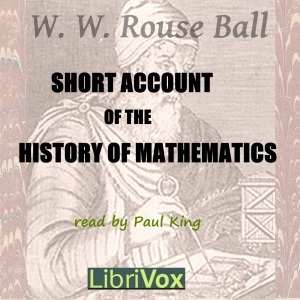What do you think?
Rate this book


20 pages, Audiobook
First published January 1, 1900
This text remains one of the clearest, most authoritative and most accurate works in the field. The standard history treats hundreds of figures and schools instrumental in the development of mathematics, from the Phoenicians to such 19th-century giants as Grassman, Galois, and Riemann.
From the Back CoverThis is the classic resource on the history of math providing a deeper understanding of the subject and how it has impacted our culture, all in one essential volume.
Only someone with the background of W.W. Rouse Ball could cover the origins of math with such breadth and expertise. Ball is the author of many respected textbooks and has worked with the foremost authorities in the field from all over Europe.
From the early Greek influences to the middle ages and the renaissance to the end of the 19th-century, trace the fascinating foundation of mathematics as it developed through the ages.